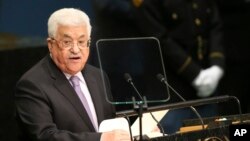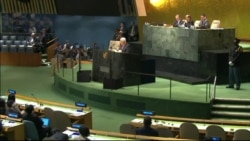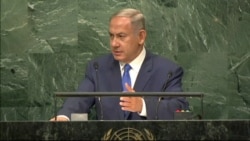Palestinian Authority President Mahmoud Abbas told the U.N.General Assembly on Thursday that Israel's ongoing settlement expansion in the occupied West Bank was destroying any hope of a two-state solution to the long-running dispute between the Jewish state and its Arab neighbors.
"What the Israeli government is doing in pursuit of its expansionist settlement plans will destroy whatever possibility is left for the two-state solution along the 1967 borders," Abbas said.
WATCH: Palestinian Authority's Abbas Speaks to U.N. General Assembly
Israeli Prime Minister Benjamin Netanyahu rejected Abbas' claims and said: "I am ready to negotiate all final-status [details], but one thing I will never negotiate is the right to a one and only Jewish state."
Netanyahu invited Abbas to address Israel's parliament, the Knesset, and said that, in return, he would like to speak directly to the Palestinian Legislative Council.
The Palestinians have rebuffed Netanyahu's past offers for such meetings, saying his hard-line position on all core issues made dialogue impossible.
WATCH: Israel's Netanyahu Speaks at U.N. General Assembly
Netanyahu rejects a "freeze" on further Jewish settlements on Arab land in the West Bank. He also rejects Israel's borders prior to the 1967 Arab-Israeli war as a starting point for negotiations, since that would mean sharing control of Jerusalem with the Palestinians and other significant territorial adjustments.
The Israeli prime minister says any division of Jerusalem is unacceptable, and he has refused to consider uprooting any of the existing Jewish settlements in Palestinian territory.
Outgoing U.N. Secretary-General Ban Ki-moon and President Barack Obama both cited Israeli settlement-building as a threat to a two-state solution in their own speeches to the assembly this week.
A "two-state solution" is diplomatic shorthand for an elusive goal: a settlement of the Israeli-Palestinian conflict in such a way that Israeli and Palestinian states could live and work side by side in peace.
Talks between the two sides last collapsed in 2014, and there are few hopes for a resumption anytime soon, in part because of Israel's anger at Palestinian violence and Palestinian criticism of settlements constructed on occupied land where it wishes to establish a state.








